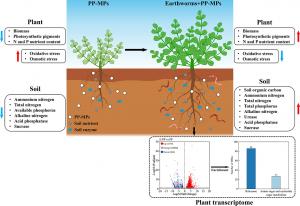Earthworms can alleviate the harmful effects of microplastic pollution on plant growth.
GA, UNITED STATES, November 5, 2025 /EINPresswire.com/ -- Researchers used pot experiments to investigate, through measuring plant physiological and biochemical indicators, soil nutrient elements and enzyme activities, as well as analyzing the gene expression of Astragalus sinicus L, that earthworms can mitigate the negative effects of polypropylene microplastics (PP-MPs) on plant growth and further explore the mechanisms of this mitigation.
With the widespread use of plastic products a large amount of microplastics (MPs) have entered soil ecosystems, leading to a continuous decline in soil environmental quality. MPs in the soil can adhere to the surfaces of plant roots, hindering nutrient absorption and disrupting physiological metabolism. Furthermore, MPs can affect water and nutrient cycles in the soil, alter soil microbial communities, and indirectly increase stress on plant growth.
Due to the complexity of soil ecosystems, mitigating the harmful effects of MPs pollution on plants remains challenging. Recently, a Chinese research team published findings in Environmental Chemistry and Ecotoxicology, revealing the role of earthworms in alleviating the negative impact of microplastics on plants. The team found that earthworms can reduce the adverse effects of microplastics on plant growth by promoting soil nutrient and organic matter cycling, improving microbial communities, and regulating plant gene expression.
Hailong Wang, who led the study, pointed out that earthworms also promote an increase in the relative abundance of microbial communities involved in nitrogen, phosphorus, and carbon cycling in soils contaminated with MPs, which is beneficial for promoting the nutrient cycling processes of nitrogen, phosphorus, and organic matter in the soil.
"Our research further reveals that earthworms can alleviate the adverse effects of MPs on plant growth by regulating gene expression in plants," says Wang. "In MPs contaminated soils, the addition of earthworms upregulates genes related to ribosomal protein synthesis in the roots of Astragalus sinicus L, improving the efficiency of protein synthesis and supporting cell development and repair."
At the same time, earthworms also promote the expression of genes related to nutrient accumulation and energy metabolism in Astragalus sinicus L, enhancing the plant's resistance to environmental stress. "We hope that the results of this study can be applied in future ecological restoration efforts and provide a scientific basis and solutions for mitigating the adverse effects of microplastic pollution on plant growth," adds Wang.
References
DOI
10.1016/j.enceco.2025.09.006
Original Source URL
https://doi.org/10.1016/j.enceco.2025.09.006
Funding information
This research was supported by Joint Special Project of Universities in Yunnan Province (202401BA070001-003), the Applied Basic Research Foundation of Yunnan Province (202301AT070051), a grant (no. 2024KF007) from State Key Laboratory for Conservation and Utilization of Bio-Resources in Yunnan and Key Laboratory of Industrial Microbial Fermentation Engineering of Yunnan Province, Yunnan University and Ten Thousand Talent Plans for Young Top-notch Talents of Yunnan Province (YNWRQNBJ-2018-011).
Lucy Wang
BioDesign Research
email us here
Legal Disclaimer:
EIN Presswire provides this news content "as is" without warranty of any kind. We do not accept any responsibility or liability for the accuracy, content, images, videos, licenses, completeness, legality, or reliability of the information contained in this article. If you have any complaints or copyright issues related to this article, kindly contact the author above.

